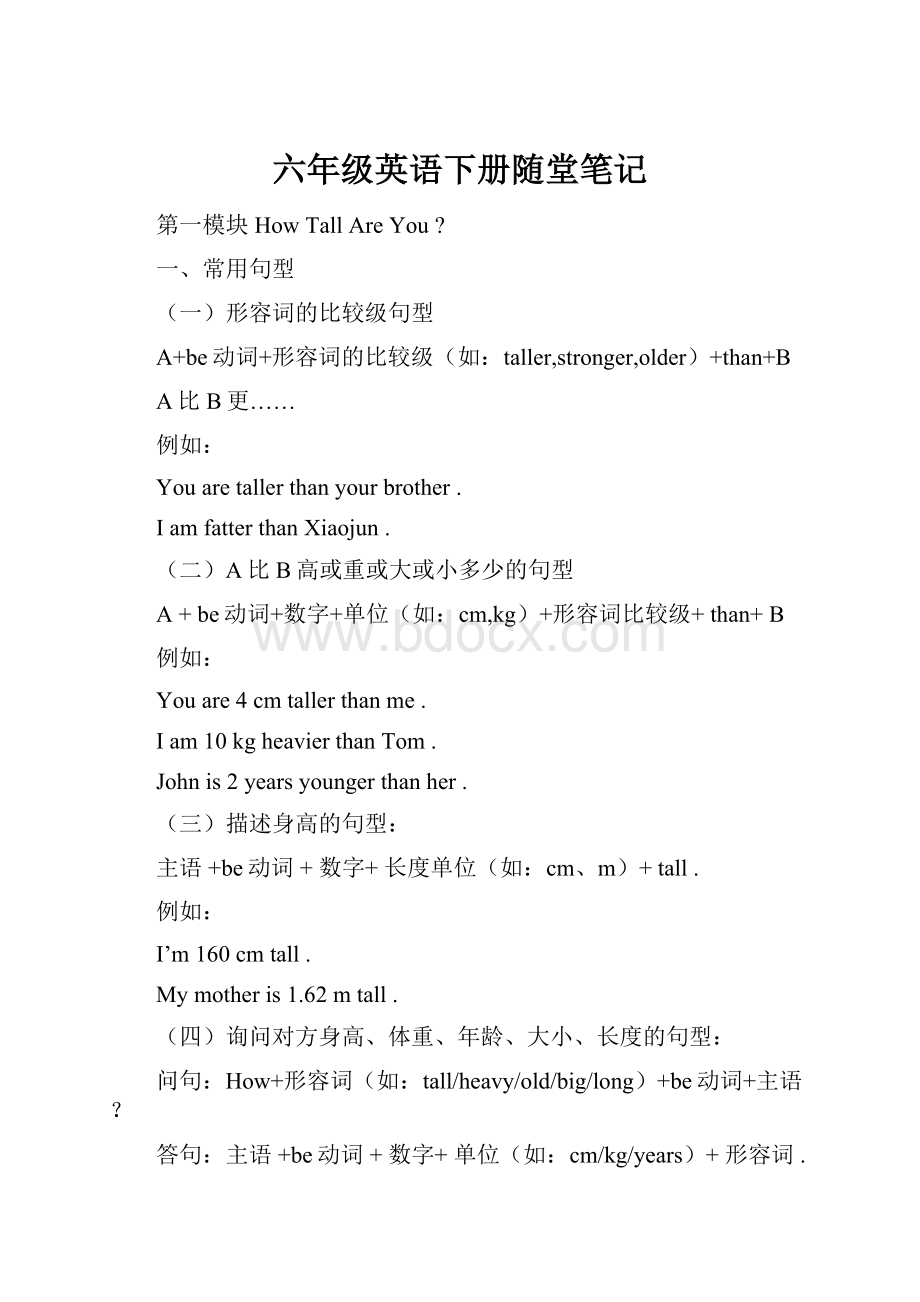 六年级英语下册随堂笔记.docx
六年级英语下册随堂笔记.docx
- 文档编号:11403078
- 上传时间:2023-02-28
- 格式:DOCX
- 页数:24
- 大小:26.75KB
六年级英语下册随堂笔记.docx
《六年级英语下册随堂笔记.docx》由会员分享,可在线阅读,更多相关《六年级英语下册随堂笔记.docx(24页珍藏版)》请在冰豆网上搜索。

六年级英语下册随堂笔记
第一模块HowTallAreYou?
一、常用句型
(一)形容词的比较级句型
A+be动词+形容词的比较级(如:
taller,stronger,older)+than+B
A比B更……
例如:
Youaretallerthanyourbrother.
IamfatterthanXiaojun.
(二)A比B高或重或大或小多少的句型
A+be动词+数字+单位(如:
cm,kg)+形容词比较级+than+B
例如:
Youare4cmtallerthanme.
Iam10kgheavierthanTom.
Johnis2yearsyoungerthanher.
(三)描述身高的句型:
主语+be动词+数字+长度单位(如:
cm、m)+tall.
例如:
I’m160cmtall.
Mymotheris1.62mtall.
(四)询问对方身高、体重、年龄、大小、长度的句型:
问句:
How+形容词(如:
tall/heavy/old/big/long)+be动词+主语?
答句:
主语+be动词+数字+单位(如:
cm/kg/years)+形容词.
例如:
Howtallareyou?
I’m160cmtall.
(五)形容词比较级的变化规则
构成方法
原级
比较级
规则变化
一般在词尾加er
tall
high
short
strong
young
taller
higher
shorter
stronger
younger
以字母e结尾的词,加r。
fine
late
finer
later
末尾只有一个辅音字母的重读闭音节词,应先双写这个辅音字母,再加er。
fat
big
thin
fatter
bigger
thinner
以y结尾,并且y前面是辅音字母的词,先把y变为i,再加er。
easy
funny
heavy
easier
funnier
heavier
不规则变化
good
bad/ill
many/much
little
better
worse
more
less
(六)如何用“how”问体貌
Howtallareyou?
Howoldareyou?
Howheavyisyourbrother?
Howlongisitstail?
Howbigareyourhands?
(七)“one”做代词的用法
one是数字“一”的意思,但有时用它做代词,用来代替上文中已经出现过的单词,以避免重复。
例如:
Whichmonkeydoyoulike?
Iliketheyellowone.
(八)“upto…”的含义
“upto…”表示“达到……”,后面常接数字。
例如:
eachupto20cmlong
Uptotenpeoplecansleepinthisroom.
二、常用短语
fromshortertotallerfrom……to……
Iwearsize17.upto……
diveinto……jumpoutof……
goodswimmerhaveatry
三、单词
dinosaurhouseschoolbagtalllongshortstrongoldyoungheavythinbigsmallfunnyitstailbrownthinkonlyabouthairheadhandeyearmlegfoottoothmetertoneachsquidlobstersharksealdeepswimmerlittlecm(centimeter)thankg(kilogram)even
第二模块What’sTheMatter?
一、常用句型
(一)关心他人的“What’sthematter?
”
“What’sthematter?
”表示“怎么了?
”
例如:
What’sthematter,John?
Ihaveatoothache.
如果询问具体某个人怎么了时,要用句型“What’sthematterwith+某人?
”,例如:
What’sthematterwiththem/him/her/you?
类似的句型还有“What’swrong?
”
What’swrong,Tom?
Ican’tfindmyschoolbag.
(二)关心他人的“Howareyou?
”
“Howareyou?
”表示“你好吗?
”
例如:
Howareyou,John?
Fine,thankyou.
(三)询问对方的感觉时,可以用以下句型:
Howdoyoufeel?
Ifeel+表示感觉的形容词(happy/sad/tired/sick)。
例如:
Howdoyoufeel?
Ifeelsick.
(四)询问第三方的感觉时,可以用以下句型:
Howdoeshe/she/it/Johnfeel?
He/She/Itis+表示感觉的形容词(happy/sad/tired/sick)。
例如:
HowdoesAmyfeel?
She’stired.
(五)如何描述对方看起来的状态---“Youlook+形容词”
“Youlook+表示状态的形容词(happy/sad/tired)”句型,表示“你看起来…”。
“look”在这里是“看起来”的意思,例如:
Youlooksohappy.
(六)听到坏消息应该怎样表示难过---“I’msorrytohearthat”
“I’msorrytohearthat”表示“听到那件事我很难过”
例如:
---What’sthematter,John?
Youlooksadtoday.
---Ifailedthemathtest.
---I’msorrytohearthat.
(七)现在进行时表示将来
Iamgoingonabigtrip.(我将要进行一次长途旅行)
用现在进行时表示将来要发生的事情或动作,常用的动词有:
go,come,take等表示位置移动的动词。
例如:
Heiscomingtoseeyouthisafternoon.
MissWhiteistakingherstudentstothezootomorrow.
(八)人人讨厌的“fail”
“fail”表示“不及格;失败”,例如:
Ifailedthemathtest.
DidyoufailtheChinesetest?
(九)讨人喜欢的“pass”
“pass”表示“通过”,例如:
AmypassedtheEnglishtest.
“pass”还表示“传递”,“把某物传给某人”可以用“passsth.tosb.”例如:
JohnpassedtheballtoTom.
(十)表示两者之间的“between”
“between”的意思是“在……之间”,当表示两者之间时,常与“and”搭配,构成“between……and……”结构。
例如:
ThereisafootballmatchbetweenClass1andClass2.
TomissittingbetweenJohnandAmy.
(十一)“another”和“other”的区别
1、“another”表示“又一个”、“另一个”,例如:
Anothergoal!
Haveanothercupoftea.
2、“other”前常加定冠词“the”,表示两个人或物中的第二个,意思为“另一个”;表示一组中其它的人或物,意思为“其它的”。
例如:
Ihavetwofriends.OneisMike,theotherisPeter.
Tomishere,buttheotherboysareatschool.
(十二)“laugh”与“laughat”的区别
1、“laugh”表示“笑,大笑”。
例如:
Thechildrenarelaughingandplayinggames.
2、“laughat”表示“嘲笑”。
例如:
Don’tlaughatthelittleboy.
(十三)“begoingto”表示一般将来时
“begoingto+动词原形”结构表示“打算或将要做某事”,是“一般将来时”的一种表达方式。
例如:
IamgoingtoflykitesnextSunday.
(十四)“have”的用法
1、表示“得……病”,例如:
haveacoldhaveafever
2、表示“吃,喝”,例如:
Theyoftenhavebreadandmilkforbreakfast.
3、表示“有”,例如:
Ihaveanewpen.
(十五)让人疼痛的“ache”
“ache”是个名词,表示“疼痛”,常放在表示身体部位的名词之后,表示“……疼”,例如:
headachetoothacheearachestomachachebackache
(十六)时间状语从句简介
引导词
例句
时间状语从句
when(当……时)
Howdoyouknowwhenyouhavetheflu?
before(在……之前)
Thegamewasoverbeforeyoucame.
after(在……之后)
Wewenttotheparkaftertherainstopped.
till/until(直到)
Thelittlegirlstoppedcryingtillhermothercame.
assoonas(一…就…)
IwillwritetoyouassoonasIgettoJinan.
注意:
时间状语从句如果放在主句前,一般要用逗号分开;时间状语从句如果放在主句后,一般不用逗号。
例如:
Thegamewasoverbeforeyoucame.
Beforeyoucame,thegamewasover.
(十七)条件状语从句简介
引导词
例句
条件状语从句
if(如果,假如)
Ifyouhaveafever,youmighthavetheflu.
unless(除非)
Heissuretocomeunlessheisill.
aslongas(只要)
Youwillgotocollegeaslongas youstudyhard.
注意:
条件状语从句如果放在主句前,一般要用逗号分开;条件状语从句如果放在主句后,一般不用逗号。
例如:
Ifyouhaveafever,youmighthavetheflu.
Youmighthavethefluifyouhaveafever.
(十八)“people”的可数与不可数
1、“people”表示“人,人们”时,是集合名词,本身就是复数概念,无复数形式。
例如:
Somepeoplefeelsickinthewinter.
2、“people”表示“民族”时,有复数形式。
例如:
Thereare56peoplesinChina.
(十九)“afew”与“few”的区别
“afew”与“few”后面都跟可数名词复数,但意思不同。
1、“afew”表示肯定,意思是“几个”。
例如:
(二十)“hurt”的用法
“hurt”作动词用时表示“伤害,弄伤,弄疼,疼痛”,既可以做及物动词,也可以做不及物动词。
例如:
Ihurtmyleg.
Myleghurts.
二、常用短语
haveaheadachehave/gettheflu
haveatoothachehaveacold
haveafeverhaveasorethroat
Mynosehurts.Mythroatissore.
takeiteasyhurtone’sleg
Don’tworry.inthewinter
seethedoctortakesomemedicine
drinkhotdrinksStayinbedforafewdays.
feelbettersoongoonabigtrip
failthemathtestalittleangry
bounceoff……flyinto……
winthegamelaughat……
buymeanewskirt=buyanewskirtforme
Ifeelbored.aghoststory
Ifeelscared.It’smidnight.
goskating
三、单词
feverhurttoothacheheadachesorethroatmatterfeelsicknosepeoplefluknowmightworrymedicinedrinkstaybettersoontiredexcitedangryhappyboredsadtripfailtesthearmatchbetweenpasskickgoalbounceoffanotherguesswinwongamelaughrobotstrawweatherfunfunnyghostscaredmidnightparent
第三模块LastWeekend
一、常用句型
(一)一般过去时:
一般过去时表示过去发生的动作或事情,常和表示过去时间的状语连用。
表示过去时间的状语包括:
yesterday,justnow,thedaybeforeyesterday,lastweek/month/year/night,anhourago等等
1、一般过去时的构成:
肯定式
否定式
含be动词的一般过去时
Iwas…
He/She/It/Johnwas…
We/You/Theywere…
Iwasn’t…
He/She/It/Johnwasn’t…
We/You/Theyweren’t…
含实义动词的一般过去时
I/You/He/She/It/John/We/They+动词过去式…
I/You/He/She/It/John/We/They
+didn’t+动词原形…
2、be动词:
一般现在时形式:
am/is/are
一般过去时形式:
am/is------wasare-------were
3、do的过去式是did
4、一般过去时的疑问句和简略答语:
第一人称(I/we)
第二人称(You)
第三人称(He/She/It/John/They)
含be动词的一般过去时的一般疑问句和简略答语
WasI…?
Yes,youwere.
No,youweren’t.
Wereyou…?
Yes,Iwas.
No,Iwasn’t.
Washe/she/it…?
Yes,he/she/itwas.
No,he/she/itwasn’t.
Werewe…?
Yes,we/youwere.
No,we/youweren’t.
Wereyou…?
Yes,wewere.
No,weweren’t.
Werethey…?
Yes,theywere.
No,theyweren’t.
含实义动词的一般过去时的一般疑问句和简略答语
DidI+动词原形…?
Yes,youdid.
No,youdidn’t.
Didyou+动词原形…?
Yes,Idid.
No,Ididn’t.
Didhe+动词原形…?
Yes,hedid.
No,hedidn’t.
Didwe+动词原形…?
Yes,we/youdid.
No,we/youdidn’t.
Didyou+动词原形…?
Yes,wedid.
No,wedidn’t.
Didthey+动词原形…?
Yes,theydid.
No,theydidn’t.
WasIfatlastyear?
Wereyoutiredyesterday?
Yes,youwere.No,weweren’t.
Wassheangryjustnow?
No,shewasn’t.
5、人称代词和物主代词
人称
人称代词
物主代词
主格
宾格
形容词性物主代词
名词性物主代词
第一人称
I
me
my
mine
we
us
our
ours
第二人称
you
you
your
yours
第三人称
he
him
his
his
she
her
her
hers
it
it
its
its
they
them
their
theirs
(1)人称代词
人称代词是为了避免重复,用来代替前面提到过的人或物。
人称代词的主格在句子中做主语。
宾格作宾语和表语。
宾语分为介词宾语和动词宾语。
介词后面的为介词宾语,及物动词后面的为动词宾语。
例如:
onMondaywithme
helphimreadbooks
表语是系动词后面的词。
常用的系动词包括:
be动词(am/is/are)、become(成为)、look(看起来)、sound(听起来)、smell(闻起来)、turn(变成)等。
例如:
Thisisapark.
Therainbecomesvapour.
Youlooksad.
Itsoundsgood.
Itsmellsbad.
(2)物主代词
物主代词是表示所有关系的代词,又分为形容词性物主代词和名词性物主代词。
形容词性物主代词起形容词的作用,后面跟名词。
例如:
Thisismybook.
Theirbagsareonthedesk.
名词性物主代词相当于“形容词性物主代词+名词”,具有名词性质,在句中作主语、宾语或表语。
例如:
Thisisyourbook,andthatismine.
Ourschoolisbeautiful,andyoursisclean.
(二)动词过去式的构成规则
构成规则
动词原形
过去式
一般在动词原形后加ed
watch
wash
watched
washed
以不发音的字母e结尾的动词,直接加d
live
love
use
dance
lived
loved
used
danced
末尾只有一个辅音字母的重读闭音节动词,先双写这个辅音字母,再加ed
stop
plan
stopped
planned
以“辅音字母+y”结尾的动词,先变y为i,再加ed
study
carry
studied
carried
以“元音字母+y”结尾的动词,直接加ed
play
stay
played
stayed
(三)常用的不规则变化动词过去式
has/have---hadam/is---wasare---weredo/does---did
win---wongo---wentread---readfly---flew
swim---swamsing---sangeat---atetake---took
buy---boughtsee---sawleave---leftget---got
come---camesay---saidfeel---feltknow---knew
draw---drewdrink---drankrun---ranwrite---wrote
(四)一般过去时的典型句型
1、一般疑问句
DidyouplayfootballwithZhangPeng?
Yes,Idid.
Didyouhelpthemcleantheirroom?
No,Ididn’t.
2、特殊疑问句
Whatdidyoudolastweekend?
IplayedfootballwithZhangPeng.
(五)help的用法
help+某人+动词原形…(帮助某人做某事)
例如:
helpthemcleantheirroom
(六)return的用法
returnsth.tosb.(把某物还给某人)
例如:
returnthekitetome
returnthepenciltoJohn
(六)grateful的用法
begratefultosb.(感谢某人)
例如:
IamgratefultoTom.
(七)询问某人过得怎么样的句型
Howwasyourweekend?
Itwasabusyone.
Howisyourfather?
Fine.
二、常用短语
dohomeworkwashtheclothes
visitgrandparentscleantheroom
gotoaparkgoswimming/fishing/hiking
watchTVplayfootballwith…
playthepianoatnight/intheevening
seethefullmooninJune
lastweekend/nightlistentomusic
playsportscooknoodles
SaturdaymorningSundayafternoon
tonguetwisterflykites
flyintothelakefiveminuteslater
jump
- 配套讲稿:
如PPT文件的首页显示word图标,表示该PPT已包含配套word讲稿。双击word图标可打开word文档。
- 特殊限制:
部分文档作品中含有的国旗、国徽等图片,仅作为作品整体效果示例展示,禁止商用。设计者仅对作品中独创性部分享有著作权。
- 关 键 词:
- 六年级 英语 下册 笔记
 冰豆网所有资源均是用户自行上传分享,仅供网友学习交流,未经上传用户书面授权,请勿作他用。
冰豆网所有资源均是用户自行上传分享,仅供网友学习交流,未经上传用户书面授权,请勿作他用。


 《城市规划基本知识》深刻复习要点.docx
《城市规划基本知识》深刻复习要点.docx
